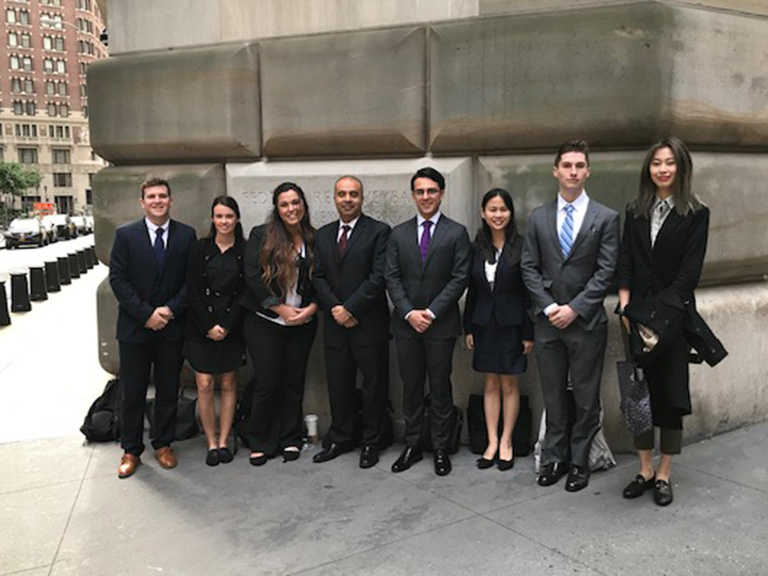 For the past seven years, a group of Manhattan College students in the School of Business, under the guidance of finance and economics department chair Hany Guirguis, Ph.D., have made recommendations and presentations on real world economics issues in the College Fed Challenge.
For the past seven years, a group of Manhattan College students in the School of Business, under the guidance of finance and economics department chair Hany Guirguis, Ph.D., have made recommendations and presentations on real world economics issues in the College Fed Challenge.
Held over three rounds on two separate days at the Federal Reserve Bank of New York in lower Manhattan, the competition takes place among 43 colleges and universities in the tri-state area.
The Manhattan students worked for months on their presentations, which detailed their forecasts for monetary policy, tracked current economic conditions, and concluded with a recommendation to the Fed on which policies to move forward.
For the third time in four years, the team reached the semifinals, becoming one of the last nine teams remaining in the rigorous competition. Having been a part of the team last year and this year, we definitely improved,” said economics major Shaina Colombo ’18. “The competition and the preparation we did allowed us to really become experts in the field.”
Current Events Provide Backdrop
On November 2, 2017, two days after the team of Jaspers made its first presentation at the College Fed Challenge, President Trump nominated Federal Reserve Governor Jerome Powell to become the Fed’s next leader. Powell is in line to replace Janet Yellen, who has served as chairperson since February 2014.
The students had been aware that a change at the head of the Federal Reserve may be coming, but did not make it a focus of their presentations. “It was always in the back of our mind,” said economics major Zoe McGreevey ’19. “It’s going to be important for us to see what happens now that that’s been decided, and what effects it has on the rest of the economy.”
A Fed governor since 2012 and former Treasury official in the George H.W. Bush administration, Powell is not an economist by trade. He was an attorney and a former partner at the Carlyle Group, a private equity firm. Despite his non-traditional background, the students believe that Powell should continue a similar monetary policy that Yellen oversaw during the past four years.
“Especially in regard to monetary policy, [Powell] is going to be in line with what Yellen had established,” said economics major Daniel Molina ’18. “We don’t think he’ll be disruptive in terms of interest rates or inflation. The biggest topic we believe he can have different input on is regulation.”
Guirguis agrees with his students about Powell’s potential to loosen regulations on smaller banks, but emphasizes that Powell is not an ideologue. “He has been very successful working with Republicans and Democrats, specifically when the debt ceiling compromise was discussed in 2011. He’s a person that can sit down and think and find his own position,” Guirguis said.
The Manhattan College students will continue to keep tabs on the country’s monetary policy as Powell’s nomination progresses to a confirmation hearing in the Senate. At the same time, the next Fed Challenge team will regroup quickly to evaluate the effects of the potential change in leadership, in preparation for next fall’s competition, continuing their work on real-world economics issues in the nation’s financial capital.